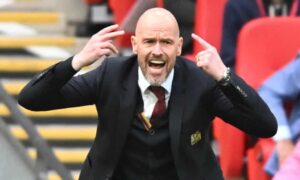
And so the real business begins. The four months since Sir Jim Ratcliffe and Ineos bought a little over a quarter of Manchester United have been the phoney war. No transfers could be done, so little could be changed on the pitch. The task of Ratcliffe and his advisers was to watch and learn and rejig the executive tier so that when the window opens they are ready to act.
That rejig has been more dramatic than many anticipated. The chief executive, Richard Arnold, and the football director, John Murtough, are just the highest profile departures. Omar Berrada will come in as chief executive from Manchester City when his notice period expires on 13 July while Murtough has effectively been replaced by Jason Wilcox, the new technical director, and Dan Ashworth, who will come in once the terms of his severance from Newcastle have been agreed.
Other changes were announced on Tuesday in what feels like a general process of Ineos-ification, suggesting Ratcliffe may have a far bigger hand in the business side of United’s operations than had been anticipated.
The biggest decision for the new regime is over Erik ten Hag. Although he is widely regarded as a dead man walking, the suggestion this week was that Ineos feel he has been let down by the broader management.
Ten Hag might also be about to pull off one of the most absurd FA Cup triumphs in history. He is not wrong when he talks about United being one of the most entertaining sides in the country, but even those who buy into the fallacy that football is a branch of showbusiness tend not to advocate throwing away comfortable leads against the likes of Newport and Coventry before winning through.
The 4-3 quarter-final victory over Liverpool stands out even in a season when United and Chelsea have been mixing brilliance and haplessness to unprecedented levels.
Bruno Fernandes ended up playing at centre-back, Antony at left-back. Liverpool, masters of chaos, should have been out of sight but found themselves out-chaosed, apparently befuddled by how often they were granted four-on-two breaks. Tactical discourse has been seized by the debate between positionism and relationism, but this was a bold step into a more distant future: no-relationism, just 11 players (eventually 10) scattered to create an unrepeatable harmony of discordance.
It would take something unexpected and deeply weird for United to beat Manchester City in the FA Cup final, but this entire run has been unexpected and deeply weird.
But the FA Cup did not save Louis van Gaal in 2016 and it may not save Ten Hag. This is not 1990. Last season Ten Hag seemed just the sort of tough, single-minded figure United needed. He managed to offload Cristiano Ronaldo and made the decision that David de Gea’s inability to play out from the back was unsustainable.
